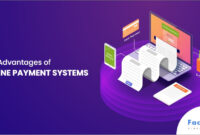Blockchain Technology Streamlining Cross-Border Transactions sets the stage for a revolutionary approach to global commerce. In an increasingly interconnected world, the need for seamless and efficient transactions across borders has never been more critical. Traditional methods often lead to delays, high fees, and complex regulations. However, blockchain technology offers a potential solution by providing a transparent, secure, and decentralized system that can facilitate these transactions with ease.

This innovative technology not only reduces costs and speeds up processes but also enhances security and trust among parties involved in cross-border dealings. As businesses and consumers alike seek faster and more reliable methods of conducting international transactions, understanding how blockchain technology can transform this landscape becomes essential.
In today’s rapidly evolving digital landscape, staying informed about the latest trends and technologies is crucial for both personal and professional development. One of the most remarkable transformations has been the rise of artificial intelligence (AI) and machine learning. These technologies have not only reshaped various industries but have also influenced the way we interact with the world around us.
In this article, we will explore the impact of AI on our daily lives, its applications across different sectors, and what the future might hold for this groundbreaking technology.AI has become an integral part of our everyday experiences, often operating behind the scenes. From voice-activated assistants like Siri and Alexa to recommendation algorithms used by streaming services such as Netflix and Spotify, AI is designed to enhance our interactions and make our lives more convenient.
These systems analyze vast amounts of data to understand user preferences and behaviors, enabling them to provide personalized experiences. For instance, when you log into Netflix and see a list of movie recommendations tailored just for you, that’s AI at work, using your viewing history and preferences to suggest films you’re likely to enjoy.Moreover, AI is making significant strides in improving efficiency in various sectors.
In healthcare, for example, AI algorithms are being used to analyze medical images, assist in diagnosing diseases, and even predict patient outcomes. These advancements not only streamline the diagnostic process but also reduce the risk of human error. Doctors can leverage AI tools to make more informed decisions, ultimately improving patient care. Additionally, AI-driven systems can help in the management of hospital resources, optimizing staff schedules based on patient inflow, thereby enhancing operational efficiency.The financial sector is another area where AI is proving to be a game-changer.
Financial institutions are utilizing machine learning algorithms to detect fraudulent transactions in real-time, analyze market trends, and even automate trading processes. By processing massive datasets at lightning speed, AI tools can identify patterns that may go unnoticed by human analysts. This capability not only increases security but also provides a competitive edge for businesses looking to optimize their investment strategies.Furthermore, AI is revolutionizing the manufacturing industry through the implementation of smart technologies.
Robotics powered by AI are taking over repetitive tasks, allowing human workers to focus on more complex and creative aspects of production. This shift not only enhances productivity but also leads to safer working environments, as robots can handle hazardous tasks that would pose risks to human employees. The concept of smart factories, where machines communicate with each other and make autonomous decisions, is paving the way for a new era of manufacturing.In the realm of education, AI is also making significant contributions.
Online learning platforms are increasingly incorporating AI to create customized learning experiences for students. By analyzing individual learning patterns and performance, these platforms can adjust the curriculum to better suit each learner’s needs. This personalized approach not only engages students more effectively but also helps educators identify areas where students may require additional support.While the benefits of AI are substantial, it is also important to address the ethical considerations that accompany its rise.
Concerns regarding job displacement due to automation have become a hot topic of discussion. As companies adopt AI-driven solutions, there is a growing fear that many jobs may become obsolete. However, it is essential to recognize that AI is also creating new job opportunities that require different skill sets. The demand for AI specialists, data analysts, and tech-savvy professionals is on the rise, emphasizing the need for educational systems to adapt and prepare the workforce for this new reality.Moreover, the use of AI in decision-making processes raises questions about accountability and bias.
Algorithms are only as good as the data they are trained on, and if that data reflects existing biases, the outcomes can perpetuate inequality. It is crucial for organizations to ensure that AI systems are developed and monitored with fairness and transparency in mind. Implementing ethical guidelines and diverse teams in AI development can help mitigate these risks and promote responsible AI usage.As we look to the future, the potential of AI seems limitless.
Researchers are continually exploring new applications, from enhancing natural language processing capabilities to developing autonomous vehicles that promise to revolutionize transportation. The key to harnessing the full potential of AI lies in collaboration between technologists, policymakers, and the public. By fostering an environment that encourages innovation while prioritizing ethical considerations, we can navigate the complexities of this technology and ensure that its benefits are shared broadly across society.In conclusion, artificial intelligence is redefining our world in profound ways.
From enhancing personal experiences to transforming industries, AI continues to push the boundaries of what is possible. As we embrace these advancements, it is essential to remain vigilant about the ethical challenges they present. By doing so, we can harness the power of AI to create a future that is not only technologically advanced but also equitable and inclusive for all.
The journey of AI is just beginning, and we are all invited to be part of this exciting evolution.




